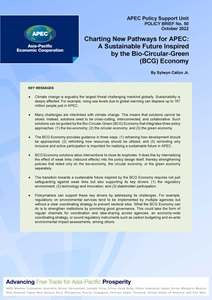Charting New Pathways for APEC: A Sustainable Future Inspired by the Bio-Circular-Green (BCG) Economy

| Published Date | October 2022 |
|---|---|
| Type of Publication | Reports |
| Publication Under | APEC Secretariat, APEC Policy Support Unit |
| Accessed | 3390 |
| Pages | 13 |
| Download publication | Download |
Description
Climate change is arguably the largest threat challenging mankind globally, and many other regional challenges are interlinked with it. This means that solutions cannot be siloed. Instead, solutions need to be cross-cutting, interconnected, and collaborative. This policy brief explored how the Bio-Circular-Green (BCG) Economy is a useful guiding framework in developing holistic solutions to these challenges. In particular, the BCG Economy reframes how development should be approached, rethinks how resources should be utilized, and reminds why inclusive and active participation is important for realizing a sustainable future. It is worth emphasizing that BCG Economy solutions allow interventions to close its loopholes. It does this by internalizing the effect of weak links (rebound effects) into the policy design itself, thereby strengthening policies that relied only on the bio-economy, the circular economy, or the green economy separately. However, the transition towards a sustainable future inspired by the BCG Economy requires not just safeguarding against these weak links but also supporting its key drivers: the regulatory environment; technology and innovation; and stakeholder participation. At the end of the day, everyone — policymakers, academia, businesses, civil society organizations, the youth, and other stakeholders — plays a key role in making sure that APEC can chart new pathways inspired by the BCG Economy, a future where succeeding generations can live better.

